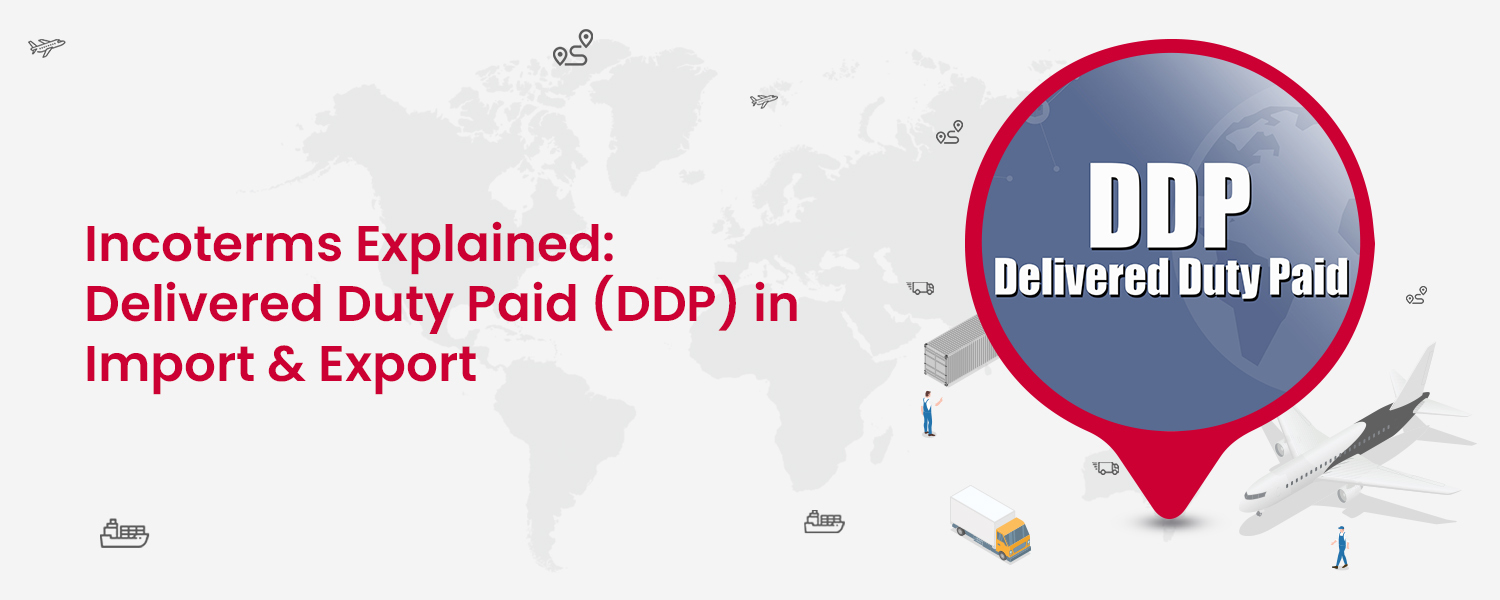In a digital age where customer satisfaction is king, incoterms equip you with the power to promise and deliver a hassle-free shopping experience to your international customers. In a realm where ambiguity can be costly, DDP emerges as a crucial Incoterm, a term of agreement that brings clarity and confidence to sellers and buyers in the international market.
Under DDP, sellers take the helm, navigating the turbulent waters of international shipping risks, customs duties, and a myriad of fees, all to ensure that their goods reach your shores safely, promptly, and without hidden costs. For eCommerce businesses, DDP can be a strategic ally, offering a competitive edge in the global marketplace.
So, in this blog post, we invite you to join us in the discussion on understanding DDP, which is more than just good business practices in eCommerce.
What is Delivered Duty Paid (DDP)?
DDP is an Incoterm, or International Commercial Term, a standardised agreement used universally to define the responsibilities of sellers and buyers in the shipping process. DDP is a term powerhouse, illuminating the path of responsibility from the seller’s door to the buyer’s receiving bay.
Under DDP, the seller bears the full spectrum of risks and costs associated with the process of delivering the goods to the buyer’s chosen destination. It’s a commitment to deliver the cargo cleared for import, ready to be unloaded from the arriving means of transportation at the named place of destination.
Seller’s Responsibilities in DDP
Overall Obligations and Costs
From the moment a product leaves the warehouse until it reaches the buyer’s hands, the seller plays a pivotal role. This encompasses not just the physical movement of goods but also the financial responsibilities accompanying it. In a DDP setting, the seller is committed to covering every expense, including transportation, insurance, customs duties, and any other charges like import duties that might arise during the transit.
Handling Export Clearance
When it comes to export clearance, the seller is obliged to comply with legalities and paperwork. This responsibility involves obtaining the necessary permits, like import export code, and ensuring all documents are in order, adhering strictly to export regulations. The process demands meticulous attention to detail, as any oversight could lead to delays or legal complications.
Managing Transport Arrangements
The logistics of transportation fall squarely on the seller’s shoulders. This includes selecting the most efficient and cost-effective mode of transport, be it air, sea, or land, and coordinating with various carriers to ensure timely delivery. The seller must also ensure the goods are transported safely and securely, minimising the risk of damage or loss during transit.
Coordination with Local Agents
Often, sellers need to work with local agents or partners in the destination country to facilitate the final delivery stages. This coordination is vital for navigating local logistics challenges, managing storage needs, and ensuring last-mile delivery is executed flawlessly.
Buyer’s Responsibilities in DDP
Receiving the Goods
The primary responsibility of the buyer in a DDP agreement is the receipt of goods at the agreed-upon destination. Timely acceptance of the goods is essential, as any delays can complicate the transaction and may lead to additional costs or logistical challenges.
Unloading of the Goods
Upon arrival, the buyer is responsible for unloading the goods. This process might require specific facilities or labour, depending on the nature of the goods and the delivery location. The buyer must ensure that the necessary arrangements are in place for efficient unloading, thus preventing any damage or delays at this final stage.
Post-Delivery Inspections
Once the goods are unloaded, the buyer should conduct a thorough inspection to check for any damage or discrepancies. This step is vital as it ensures that the goods received are in the expected condition and quantity.
Handling of Post-Delivery Formalities
In some cases, the buyer might need to complete certain formalities after delivery. This could include local compliance filings or regulatory procedures specific to the buyer’s location. While the seller handles most of the customs and importation processes, the buyer should be aware of and manage any local requirements post-delivery.
Advantages of DDP for eCommerce Businesses
- Under DDP, the complexity of managing intricate shipping and customs processes is significantly reduced.
- With the seller taking on the responsibility for transportation, customs clearance, and all associated risks until the goods reach the buyer, there’s a significant decrease in uncertainties that typically accompany international shipping.
- DDP removes the burden of unexpected costs and delays from the buyer, enhancing overall customer satisfaction.
- For eCommerce businesses eyeing global expansion. By assuming responsibility for all shipping and customs formalities, DDP reduces the barriers that often hinder entry into new international markets.
- DDP enables sellers to effectively manage the risks associated with international shipping.
Disadvantages of DDP for eCommerce Businesses
- While advantageous for buyers, the Delivered Duty Paid (DDP) Incoterm places a significant financial burden on sellers.
- Navigating through the intricacies of customs regulations in different countries is another daunting challenge under DDP.
- In a DDP agreement, sellers often have to rely on third-party logistics services and carriers, leading to a loss of direct control over the transportation and logistics of their products.
Conclusion
DDP can be a powerful tool for businesses equipped to handle their demands, offering a streamlined and customer-friendly shipping solution. However, it requires a deep understanding of its intricacies and a strategic approach to international logistics. Here, you can outsource complex tasks like customer clearance, freight transportation, and order fulfilment to NimbusPost, like logistics aggregators. eCommerce businesses can make informed choices with NimbusPost, find the best international courier services with a courier recommendation engine, get faster freight forwarding, custom clearance, and reduced shipping costs.
FAQs
What is the difference between DAP and DDP?
The main difference between DAP (Delivered at Place) and DDP (Delivered Duty Paid) lies in who is responsible for import duty, taxes, and security clearance. In DDP, the seller assumes full responsibility for these costs and risks from the beginning to the end of the shipment, including delivery to the buyer’s location. Conversely, in DAP, the buyer is responsible for the costs and taxes related to import clearance. This key distinction makes DDP a more seller-centric arrangement, while DAP places more financial responsibility on the buyer.
What is the difference between CIF and DDP incoterm?
The primary difference between CIF (Cost, Insurance, and Freight) and DDP (Delivered Duty Paid) Incoterms lies in allocating costs, risks, and responsibilities between the seller and buyer during shipping transactions. In CIF, the seller covers the costs, insurance, and freight of delivering goods to the destination port, with the buyer taking responsibility for transport from the port and any import duties, taxes, or VAT. Conversely, under DDP, the seller assumes all responsibilities and costs, including transport, taxes, and import duties, up to the final agreed-upon destination, even managing import clearance in the buyer’s country.
What is the difference between DDU and DDP incoterm?
The key difference between DDU (Delivered Duty Unpaid) and DDP (Delivered Duty Paid) Incoterms lies in duties, taxes, and import clearance responsibility. Under DDU, the seller ensures safe delivery to the destination, but the buyer is responsible for import duties and taxes. In contrast, with DDP, the seller takes full responsibility for all shipping aspects, including duties, taxes, import clearance, and final delivery.
Who pays freight in DDP?
The seller is responsible for all freight costs in a Delivered Duty Paid (DDP) agreement.




